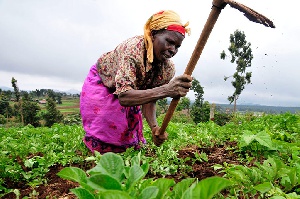The global market for organic agricultural produce is growing in leaps and bounds, but the country is hardly taking advantage of it, the Ghana Ecological Organic Agriculture Platform (GEOAP), has said, calling on government to sit up.
Organic agriculture avoids the use of synthetic inputs, such as synthetic fertilizers and pesticides, veterinary drugs, and genetically modified foods, among others, that are believed to have adverse effects, to sustain the health of soils.
Studies have shown that only about 19,132 hectares of land are under organic cultivation which accounts for 0.13percent of the total agricultural land area in Ghana.
Globally, some 43.7 million hectares of agricultural land are said to be under organic cultivation, with Africa having only three percent of that.
Market research company, Organic Monitor, estimates the global market for organic products in 2013 to have reached 72 billion US Dollars (approximately 55 billion euros).
The United States is the leading market with 24.3 billion euros, followed by Germany (7.6 billion euros) and France (4.4 billion euros).
In 2013, official market data was for the first time ever published for China (2.4 billion euros), making that country the fourth biggest organic market in the world. The highest per capita spending was in Switzerland (210 euros) and Denmark (163 euros).
In an interview with the B&FT during a workshop organized to discuss key interventions to grow the Ghana Ecological Organic Agriculture Sector, Professor Ofosu Budu, Head of the University of Ghana Agriculture Research Centre, said education and awareness about the advantages that organic agriculture has to offer the economy must be intensified in order to spur economic growth.
“The market for organic agriculture as a niche market is growing at a fast rate. So as a nation, we can train our youth to venture into this area so that we can produce more and export. Ghana has the capacity and competitive advantage to do this. There is little awareness created about the health and economic benefits associated with it,” he said.
Meanwhile, the country’s agricultural sector is experiencing a constant decline for a number of years now. Government last year cut its 2016 expenditure on the agricultural sector by GH?40million despite growth in the agriculture sector stalling to 0.04 percent this year, when government had targeted 3.6 percent growth.
“If you compare tomatoes that is produced by organic means to the ones that is produced conventionally with fertilizer, you will see that the ones grown with fertilizer is likely to go bad than the organic ones.
Most of the diseases these days come from what we eat and so if we are conscious about organic foods, we will be able to prevent some of these diseases,” Prof. Budu said.
Also commenting on how the situation can be improved to add to the growth of the economy, Pierre Johnson, a UNIDO Consultant, said his outfit is organizing a capacity building exercise for stakeholders in order to draw a plan that will guide the sector and make it one of the vibrant in the economy.
“Our little study shows most Ghanaians do not have enough knowledge about the specificity of organic agriculture as well as the benefits that come with it. They also have challenges of moving from conventional agriculture to fully organic.
At the end of the study and the capacity building, we will be able to develop a solid plan for this project. But for now we are focusing on how to build the capacity of the stakeholders interested in organic agriculture so that they will know how to completely implement organic agriculture.
Organic agriculture is a way of economic improvement in Ghana because it is a type of activity that employs people and also preserves the environment,” Mr. Johnson stated.
Another discussion that the GEOAP deliberated on is the adoption of compost with Soldier Ants for improving soil fertility.
In line with this, Prof. Budu said a current study is being carried out by the Ghana Compost Project to determine how best the Black Soldier Fly larvae can be used to decompose market waste to fertilize the soil and eventually get fish feed to supply to fishermen.
“The Ghana Compost Project is trying to use the Black Soldier Fly larvae to de-create the market waste. There are a lot of market waste in the system and so we are more concerned as to how to manage those waste.
We are looking at the possibility where we can use the larvae at some point in time to formulate fish meal and use the residue as compost. Through this we want to create a locally sustainable production using compost,” Prof. Budu said.
Business News of Thursday, 22 September 2016
Source: B&FT
Ghana losing out on US$70 billion organic agric market
Entertainment
















